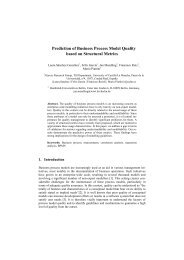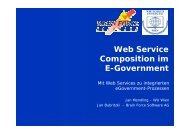- Page 1: Detection and Prediction of Errors
- Page 6 and 7: zwei Analysewerkzeuge, zum einen ei
- Page 8 and 9: mermüde Unterstützung und ihr Ver
- Page 10 and 11: ii Contents 3.2 EPC Syntax . . . .
- Page 12 and 13: iv Contents 7 Conclusions 217 7.1 S
- Page 14 and 15: vi List of Figures 3.13 Transition
- Page 16 and 17: viii List of Figures 5.4 Two EPCs w
- Page 18 and 19: x List of Figures A.22 Financial Ac
- Page 20 and 21: xii List of Figures A.59 Quality Ma
- Page 22 and 23: xiv List of Figures B.6 Compensatio
- Page 24 and 25: xvi List of Figures B.41 Project Ma
- Page 26 and 27: xviii List of Figures C.31 Box plot
- Page 28 and 29: xx List of Figures C.87 Box plot fo
- Page 30 and 31: xxii List of Tables D.1 Tolerance V
- Page 32 and 33: xxiv Table of Acronyms GQM Goal-Que
- Page 34 and 35: xxvi Table of Acronyms
- Page 36 and 37: 2 1. Introduction Dav93, JB96, Sch9
- Page 38 and 39: 4 1. Introduction tion of the actua
- Page 40 and 41: 6 1. Introduction Section 1.3.2 use
- Page 42 and 43: 8 1. Introduction Environment Peopl
- Page 44 and 45: 10 1. Introduction implementations
- Page 46 and 47: 12 1. Introduction 1.4 Structure of
- Page 48 and 49: 14 1. Introduction
- Page 50 and 51: 54 3. Event-driven Process Chains (
- Page 52 and 53: 56 3. Event-driven Process Chains (
- Page 54 and 55:
58 3. Event-driven Process Chains (
- Page 56 and 57:
60 3. Event-driven Process Chains (
- Page 58 and 59:
62 3. Event-driven Process Chains (
- Page 60 and 61:
64 3. Event-driven Process Chains (
- Page 62 and 63:
66 3. Event-driven Process Chains (
- Page 64 and 65:
68 3. Event-driven Process Chains (
- Page 66 and 67:
70 3. Event-driven Process Chains (
- Page 68 and 69:
72 3. Event-driven Process Chains (
- Page 70 and 71:
74 3. Event-driven Process Chains (
- Page 72 and 73:
76 3. Event-driven Process Chains (
- Page 74 and 75:
78 3. Event-driven Process Chains (
- Page 76 and 77:
80 3. Event-driven Process Chains (
- Page 78 and 79:
82 3. Event-driven Process Chains (
- Page 80 and 81:
84 3. Event-driven Process Chains (
- Page 82 and 83:
86 3. Event-driven Process Chains (
- Page 84 and 85:
88 3. Event-driven Process Chains (
- Page 86 and 87:
90 3. Event-driven Process Chains (
- Page 88 and 89:
92 3. Event-driven Process Chains (
- Page 90 and 91:
94 3. Event-driven Process Chains (
- Page 92 and 93:
96 3. Event-driven Process Chains (
- Page 94 and 95:
Appendix A Errors found with xoEPC
- Page 96 and 97:
Actual costs were incurred Costs we
- Page 98 and 99:
Actual costs were incurred Costs we
- Page 100 and 101:
Need to correct benefits selection
- Page 102 and 103:
AND might not get control from XOR
- Page 104 and 105:
Need for budget planning exists Nee
- Page 106 and 107:
Maintenance Maintenance Schedule pl
- Page 108 and 109:
Document blocked due to legal contr
- Page 110 and 111:
Technical findings are entered Meas
- Page 112 and 113:
Document blocked due to legal contr
- Page 114 and 115:
Secondary Cost Planning (Prop./ F i
- Page 116 and 117:
Customer invoice is to be parked Do
- Page 118 and 119:
Down payment is to be cleared manua
- Page 120 and 121:
Local chart of a ccounts is assigne
- Page 122 and 123:
Budgeting must be executed in sever
- Page 124 and 125:
Data is to be summarized Rollup was
- Page 126 and 127:
Position exists Department and assi
- Page 128 and 129:
Position exists Department and assi
- Page 130 and 131:
Need for personnel development syst
- Page 132 and 133:
Personnel development system is imp
- Page 134 and 135:
Measurement doc. should be created
- Page 136 and 137:
Maintenance tasks are to be process
- Page 138 and 139:
Capacity situation is to be evaluat
- Page 140 and 141:
Measurement doc. should be created
- Page 142 and 143:
PM order is created and released Or
- Page 144 and 145:
Capacity load is updated Open mater
- Page 146 and 147:
PM order is created and released Ma
- Page 148 and 149:
Down payment is to be cleared manua
- Page 150 and 151:
Evaluation to be performed using th
- Page 152 and 153:
Inspection lot is to be created man
- Page 154 and 155:
Quality level is updated Evaluation
- Page 156 and 157:
Maintenance order is completed with
- Page 158 and 159:
Enter defects from the inspection l
- Page 160 and 161:
Credit posting to be made Periodic
- Page 162 and 163:
Enterprise requires notification of
- Page 164 and 165:
New Period New Period New Period to
- Page 166 and 167:
Order is created Goods issue is pos
- Page 168 and 169:
Quotation is valid Framework agreem
- Page 170 and 171:
Quotation is valid Framework agreem
- Page 172 and 173:
Order is created Sales requirements
- Page 174 and 175:
Notification of business event mana
- Page 176 and 177:
Preparation of business event perfo
- Page 178 and 179:
Netting proposal was accepted 2) OR
- Page 180 and 181:
Forex Transaction Currency spot is
- Page 182 and 183:
Netting proposal was accepted Custo
- Page 184 and 185:
Customer open items were generated
- Page 186 and 187:
Appendix B EPCs not completely redu
- Page 188 and 189:
Acquisition posted to Asset Account
- Page 190 and 191:
Adaptation of benefits participatio
- Page 192 and 193:
Employee notified of exercise Need
- Page 194 and 195:
Service contract to be created from
- Page 196 and 197:
Cost Estimates Should Be Made for M
- Page 198 and 199:
Delivery is relevant for billing Bi
- Page 200 and 201:
Service Default Service order value
- Page 202 and 203:
Order is to be Created from Contact
- Page 204 and 205:
Currency translation carried out Co
- Page 206 and 207:
Data is to be posted from the FI co
- Page 208 and 209:
Employee staffs position Notificati
- Page 210 and 211:
Cost Estimates Should Be Made for M
- Page 212 and 213:
Maintenance Maintenance Maintenance
- Page 214 and 215:
TO item confirmed without differenc
- Page 216 and 217:
Components to be replenished as per
- Page 218 and 219:
Planned Order Created Automatically
- Page 220 and 221:
Planned Order Created Automatically
- Page 222 and 223:
Separate planning run to be carried
- Page 224 and 225:
Overall Material Requirements Plann
- Page 226 and 227:
Material has arrived Goods Receipt
- Page 228 and 229:
Necessary to contact vendor Define
- Page 230 and 231:
Certificate request exists Certific
- Page 232 and 233:
Lease-out should be processed Lease
- Page 234 and 235:
Enterprise receives acceptance of o
- Page 236 and 237:
Profit center plan data complete Pr
- Page 238 and 239:
Deliveries need to be planned Deliv
- Page 240 and 241:
Direct mailing campaign is processe
- Page 242 and 243:
Advance payment Trip advance is tra
- Page 244 and 245:
Appendix C Descriptive Statistics o
- Page 246 and 247:
C.1. Definition of Variables 375 Ta
- Page 248 and 249:
C.2. Box plots filtered by model gr
- Page 250 and 251:
C.2. Box plots filtered by model gr
- Page 252 and 253:
C.2. Box plots filtered by model gr
- Page 254 and 255:
C.2. Box plots filtered by model gr
- Page 256 and 257:
C.2. Box plots filtered by model gr
- Page 258 and 259:
C.2. Box plots filtered by model gr
- Page 260 and 261:
C.2. Box plots filtered by model gr
- Page 262 and 263:
C.2. Box plots filtered by model gr
- Page 264 and 265:
C.2. Box plots filtered by model gr
- Page 266 and 267:
C.2. Box plots filtered by model gr
- Page 268 and 269:
C.2. Box plots filtered by model gr
- Page 270 and 271:
C.3. Box plots filtered by error 39
- Page 272 and 273:
C.3. Box plots filtered by error 40
- Page 274 and 275:
C.3. Box plots filtered by error 40
- Page 276 and 277:
C.3. Box plots filtered by error 40
- Page 278 and 279:
C.3. Box plots filtered by error 40
- Page 280 and 281:
C.3. Box plots filtered by error 40
- Page 282 and 283:
C.3. Box plots filtered by error 41
- Page 284 and 285:
C.3. Box plots filtered by error 41
- Page 286 and 287:
C.3. Box plots filtered by error 41
- Page 288 and 289:
C.3. Box plots filtered by error 41
- Page 290 and 291:
C.3. Box plots filtered by error 41
- Page 292 and 293:
C.3. Box plots filtered by error 42
- Page 294 and 295:
C.4. Analysis of Variance for Metri
- Page 296 and 297:
C.5. Correlation between hasErrors
- Page 298 and 299:
Appendix D Logistic Regression Resu
- Page 300 and 301:
D.2. Univariate Logistic Regression
- Page 302 and 303:
D.3. Multivariate Logistic Regressi
- Page 304 and 305:
D.3. Multivariate Logistic Regressi
- Page 306 and 307:
D.4. Second Best Logistic Regressio
- Page 308 and 309:
D.5. Third Best Logistic Regression
- Page 310 and 311:
D.5. Third Best Logistic Regression
- Page 312 and 313:
Bibliography [AAB + 05] A. Arkin, S
- Page 314 and 315:
Bibliography 443 on Advanced Inform
- Page 316 and 317:
Bibliography 445 [AWM04] W.M.P. van
- Page 318 and 319:
Bibliography 447 with Event-Driven
- Page 320 and 321:
Bibliography 449 [Bun77] M. Bunge.
- Page 322 and 323:
Bibliography 451 [CLRS01] T.H. Corm
- Page 324 and 325:
Bibliography 453 Paraboschi and K.
- Page 326 and 327:
Bibliography 455 [FL03] P. Fettke a
- Page 328 and 329:
Bibliography 457 ceedings, volume 2
- Page 330 and 331:
Bibliography 459 [HATB98] J. F. Hai
- Page 332 and 333:
Bibliography 461 October 24-28, 200
- Page 334 and 335:
Bibliography 463 [Jon86] C. Jones.
- Page 336 and 337:
Bibliography 465 [KN92] R.S. Kaplan
- Page 338 and 339:
Bibliography 467 [Leh97] F. Lehner.
- Page 340 and 341:
Bibliography 469 [LZLC02] H. Lin, Z
- Page 342 and 343:
Bibliography 471 J.L. Fiadeiro S. D
- Page 344 and 345:
Bibliography 473 [MNN05b] J. Mendli
- Page 346 and 347:
Bibliography 475 [Mur89] T. Murata.
- Page 348 and 349:
Bibliography 477 [OMG02] OMG, ed. M
- Page 350 and 351:
Bibliography 479 [RGA + 06] V. Rubi
- Page 352 and 353:
Bibliography 481 [Sch98c] R. Schüt
- Page 354 and 355:
Bibliography 483 [SM06] C. Simon an
- Page 356 and 357:
Bibliography 485 [SW04] P. Soffer a
- Page 358 and 359:
Bibliography 487 [VA06] H. M. W. Ve
- Page 360 and 361:
Bibliography 489 [WHM06] I. Weber,
- Page 362:
Bibliography 491 [Zus91] H. Zuse. S




